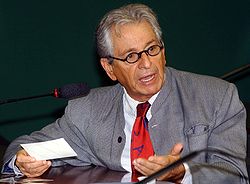| Revision as of 03:27, 16 May 2013 editSquids and Chips (talk | contribs)Extended confirmed users, Pending changes reviewers37,148 editsm WPCleaner v1.27 - Repaired 1 link to disambiguation page - (You can help) - Literally← Previous edit | Revision as of 20:06, 23 June 2013 edit undoWaacstats (talk | contribs)Autopatrolled, Extended confirmed users, Pending changes reviewers1,348,587 edits →External links: add persondata short description using AWBNext edit → | ||
| Line 40: | Line 40: | ||
| {{Authority control|VIAF=17342057}} | {{Authority control|VIAF=17342057}} | ||
| {{Persondata <!-- Metadata: see ]. --> | {{Persondata <!-- Metadata: see ]. --> | ||
| | NAME = Gabeira, Fernando | | NAME = Gabeira, Fernando | ||
| | ALTERNATIVE NAMES = | | ALTERNATIVE NAMES = | ||
| | SHORT DESCRIPTION = | | SHORT DESCRIPTION = Brazilian politician | ||
| | DATE OF BIRTH = February 17, 1941 | | DATE OF BIRTH = February 17, 1941 | ||
| | PLACE OF BIRTH = | | PLACE OF BIRTH = | ||
Revision as of 20:06, 23 June 2013

Fernando Paulo Nagle Gabeira (Portuguese pronunciation: [feʁˈnɐ̃du ɡaˈbejɾɐ]; born February 17, 1941 in Juiz de Fora, Minas Gerais) is a Brazilian politician, author and journalist. He has been a federal deputy for the State of Rio de Janeiro since 1995.
Because of his role in the kidnapping of the ambassador Charles Burke Elbrick, Gabeira cannot enter in United States and its territories. Gabeira has asked for a visa revision three times, and was denied each time.
Biography
He is best known for his book O que é isso, companheiro? (literally "What is this, comrade?"). Written in 1979, the book tells of the armed resistance to the military dictatorship in Brazil, and particularly describes the 1969 episode of the kidnapping of the American ambassador Charles Burke Elbrick, in which Gabeira took part as a member of MR8, a group trying to install a socialist government. The book was made into a movie in 1997, titled Four Days in September in English. The movie was nominated for many awards, including the Best Foreign Language Film by the Academy Awards.
In a May 2009 interview with Ragga magazine, he said "I was in error" in kidnapping the American ambassador in 1969 and that he would never participate in anti-American activity now.
Gabeira was also one of the founding members of the Green Party of Brazil, but left the group in 2002 to join the Workers' Party. Recently he rejoined the Greens, due to his disappointment with Luiz Inácio Lula da Silva's government, and also because of the way the Worker's Party was dealing with its remaining far-left members.
During his exile, in the 70s, Gabeira lived in many countries as Chile, Sweden and Italy. In Stockholm, the city that he spent most of his exile in, he studied Anthropology - at University of Stockholm - and worked as a journalist as well as metro conductor.
Gabeira has repeatedly voiced his ideological support for the legalization of marijuana.
Fernando Gabeira ran for the mayoral office in Rio de Janeiro, and was defeated by Eduardo Paes in the run off round on October 26, 2008 (49,3% – 50,7%).
The knitted swimsuit affair
Gabeira is a cousin of Leda Nagle, a well-known Brazilian TV hostess. Gabeira lived many years exiled from Brazil, during the military dictatorship, and returned to his country in 1979. Just after his return to Brazil, a photo of Gabeira wearing a very small knitted swimsuit on Ipanema beach turned into a national scandal. Many years later, Gabeira revealed that his scandalous bathing suit was indeed the bottom part of one of Leda Nagle's bikinis.
Family
Gabeira was married to Brazilian fashion designer,Yame Reis. Two daughters, Tami and Maya, came from that union. The couple divorced in 1999. His daughter Maya has since become a top female big wave surfer. She said the trauma of her parents' divorce drove her to leave home at age 15 to Australia on a student program and then move to Hawaii at age 17 in 2004 to surf Hawaii. She quickly emerged as the world's top female big-wave surfer, winning global championships surfing challenging spots like Mavericks, Waimea, Todos Santos, and South Africa's shark-infested Dungeons. She told Huck Magazine in 2007: “My dad and I are very similar. All the energy he’s put into improving the country I have as well – only I’ve been channelling it into my surfing.” She added: “My dad has a really strong character, is incredibly bright and I’ve learned a lot from him.”
References
- http://www1.folha.uol.com.br/folha/brasil/ult96u456947.shtml
- http://super.abril.com.br/superarquivo/1994/conteudo_114292.shtml
- http://tribunadonorte.com.br/noticia/ex-militante-recebe-visto-dos-estados-unidos/127907
- https://segueuserfiles.middlebury.edu/.../Fernando%20Gabeira.doc
- Gabeira's swimsuit affair, from Isto é Gente magazine (in Portuguese)
External links
- Fernando Gabeira's official website (in Portuguese)
- Fernando Gabeira at IMDb
- Interview to journalist Sidney Rezende (in Portuguese)
- Interview with Ragga magazine, discussing how he's changed since the kidnapping, identifies daughter Tami. (in Portuguese)
- Maya Gabeira's interview with Huck magazine, discussing her father. (in English)
- Maya Gabeira emerges as women's surfing champion, from The Guardian discussing her family life (in English)
- Surf champ Maya Gabeira discusses for The Independent her upbringing with her father (in English)
- Interview with Maya Gabeira discussing her upbringing for Women's Health magazine; mother identified (in English)